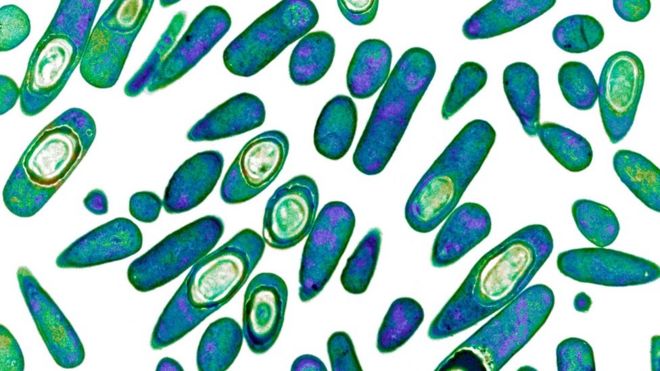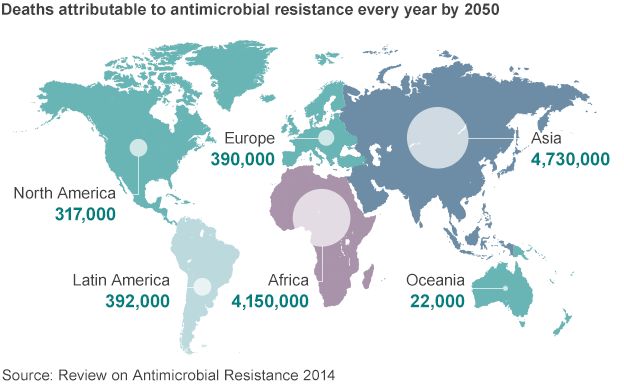- 19 May 2016
- Health
-
(건강) 항생제의 남용을 중지하겠다는 전세계적 각성의 혁명이 필요아름다운 인생/건강 2016. 5. 22. 19:00
출처: http://www.bbc.com/news/health-36321394
Global antibiotics 'revolution' needed
 SCIENCE PHOTO LIBRARY
SCIENCE PHOTO LIBRARYA global revolution in the use of antimicrobials is needed, according to a government backed report. (antimicrobials: 항미생물제, 항균제)
Lord Jim O'Neill, who led the Review on Antimicrobial Resistance, said a campaign was needed to stop people treating antibiotics like sweets. 전세계적으로 항생제를 마치 사탕 먹듯 남용하는데, 이를 중지시켜야 한다는 캠페인.
It is the first recommendation in the global plan for preventing medicine "being cast back into the dark ages".
The report has received a mixed response with some concerned that it does not go far enough.
Superbugs, resistant to antimicrobials, are estimated to account for 700,000 deaths each year. 항생제 남용을 중단하자는 캠페인의 목적: 항생제에 내성이 있는 수퍼버그(항생제로 제거 안 되는 박테리아)들이 매년 70만명의 목숨을 앗아간 것으로 추정되기 때문.
But modelling up to the year 2050, by Rand Europe and auditors KPMG, suggests 10 million people could die each year - equivalent to one every three seconds. 2050년까지 시뮬레이션을 진행한 바에 의하면, 매년 1천만 명(3초에 한 명꼴)이 사망할 것으로 보임.

The report brings together eight previous interim reports that recommended:
- An urgent and massive global awareness campaign as most people are ignorant of the risks
- Establishing a $2bn ($1.4bn) Global Innovation Fund for early stage research
- Improved access to clean water, sanitation and cleaner hospitals to prevent infections spreading
- Reduce the unnecessary vast antibiotic use in agriculture including a ban on those "highly critical" to human health
- Improved surveillance of the spread of drug resistance
- Paying companies $1bn (£0.7bn) for every new antibiotic discovered
- Financial incentives to develop new tests to prevent antibiotics being given when they will not work
- Promoting the use of vaccines and alternatives to drugs
The review said the economic case for action "was clear" and could be paid for using a small cut of the current health budgets of countries or through extra taxes on pharmaceutical companies not investing in antibiotic research.
Lord Jim O'Neill, the economist who led the global review, said: "We need to inform in different ways, all over the world, why it's crucial we stop treating our antibiotics like sweets.
"If we don't solve the problem we are heading to the dark ages, we will have a lot of people dying.
"We have made some pretty challenging recommendations which require everybody to get out of the comfort zone, because if we don't then we aren't going to be able to solve this problem."
Eight years of hell

It is hoped the measures will prevent more people going through experiences like Emily Morris from Milton Keynes.
She has regular urinary tract infections that do not respond to some antibiotics and could cause kidney damage or even death.
She says: "With every sting and every pain, my heart sinks at the thought of how many antibiotics I have left to use this time.
"I've had the struggle of living with a resistance to antibiotics for nearly eight years of my life...there is a clear need for new antibiotics."
Pharma challenge
Exactly how to encourage the drugs industry to make new antibiotics has been a long running problem - there has not been a new class of antibiotics discovered since the 1980s.
A new antibiotic would be kept on the shelf for use in emergencies so a company could never make back its huge research and development costs.
John Rex, from the antibiotics unit at AstraZeneca, said a new way of paying for drugs, as proposed in the report, was needed.
He argued: "Such models should recognise antibiotics as the healthcare equivalent of the fire extinguisher - they must be available on the wall at all times and have value even when used only infrequently."
Not enough
But Dr Grania Brigden, from the charity Médecins Sans Frontières, said: "This report is an important first step in addressing this broad market failure, it does not go far enough."
MSF said infections resistant to drugs were a threat to their work around the world from the war-wounded in Jordan to newborns in Niger.
Dr Brigden added: "The O'Neill report proposes considerable new funding to overcome the failures of pharmaceutical research and development, but the proposals do not necessarily ensure access to either existing tools or emerging new products.
"Instead, in some cases, the report's solution is simply to subsidise higher prices rather than trying to overcome them."
'아름다운 인생 > 건강' 카테고리의 다른 글
(건강) 전자담배는 일반담배만큼 정말 위험할까? (0) 2016.05.26 (건강) 위키피디아: 항생물질 (0) 2016.05.22 (건강) 전세계인의 수면 패턴 (0) 2016.05.09 (건강) 공기가 안 좋은 곳이더라도 실외에서 운동하는 것이 안 하는 것보다 유익하다 (0) 2016.05.05 (건강) BBC: 의사들曰 금연하려면 차라리 전자담배를 피워라 (0) 2016.04.29